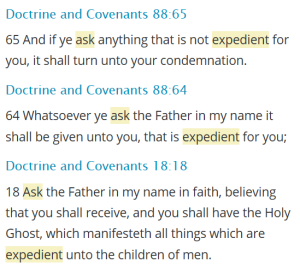I am often on my knees asking for those things that I feel I need and want. I am often praying for guidance. I am often looking for peace, or inspiration. Aren’t we all? I am often on my knees because that’s where I’m supposed to be. I’m more frequently on my knees (these days) because I know nowhere else to go to get the power, comfort, peace and reassurance I need. Indeed, there is nowhere else to go…in my experience.
Efficiency is something I like. I’m great at cleaning and organizing quickly because I’m efficient. I know how to see all that needs to be done and find ways to organize and clean in an order that saves time while also accomplishing a great deal at a high quality. I can be detail oriented when I need to be, but I never get lost in details.
Prayer is something I have worked long and hard to be efficient at. Not efficient as in praying as fast as I can, in as few words, with the most impact, like I’m running a business, or organizing files. No, efficient as in getting the power and guidance out of prayer that I need. Getting out of my own way, so to speak. Praying in a way that works. Not simply spouting words or expecting God to read my mind (which I know He can do). And, by focusing on how to make my prayers matter TO ME, I find that I offer them better and with more effect, granting me expediency…or the ability to get those things I so desperately seek.
I hope I’m saying this right. There are many ways to accomplish things in life. But, there are better ways, and best ways. I’ve spent a lot of time trying to, metaphorically speaking, eliminate the fluff, and get to a point where my prayers hopefully have maximum efficiency in helping me to increase my relationship with God and my ability to call down the powers of heaven to gain peace, guidance, inspiration, and assurance on my path through this life.
One of the ways I have found that I’ve been able to improve upon this (because I’m in no way perfect at prayer) is to understand and utilize the power of expediency.
Expedient
Several times in the Doctrine and Covenants, an entire book of revelation given based on expediency, we see the word expedient used to define what should be asked for in prayer and/or what things will be manifested unto us by the Holy Ghost (Doctrine and Covenants 18:18; 88:64-65).
Expedient = what is advantageous, practical, beneficial, useful
The scriptures are full of counsel regarding prayer. There are some important elements: addressing God—the Father, expressing gratitude, seeking forgiveness of sins, praying over anything in our lives that we need help with, asking for grace, praying for others, etc., and closing in the name of Jesus Christ—our Mediator.
However, when it comes to getting specific answers from God to our prayers, there are guidelines that are given. However, it hasn’t been until very recently that I have begun to understand, to a better extent, all the guidelines and examples of expedient prayers given in the scriptures and what they mean for me. And, more importantly, how to use them to receive the answers I seek.
What NOT to Ask For
In the scriptures, God has told us in many ways  things we are not supposed to ask for. We are to not ask for things that are not expedient (Doctrine and Covenants 88:5). We are not to ask for signs for proof, or to create faith or testimony (Doctrine and Covenants 63:7-12). We are commanded not to ask for things to consume upon our lusts (James 4:3). We are not to seek for revenge upon our enemies (Matthew 5:44). We are not to pray for riches, except that we may use what riches we receive to build up the kingdom of God (Jacob 2:19), etc.
things we are not supposed to ask for. We are to not ask for things that are not expedient (Doctrine and Covenants 88:5). We are not to ask for signs for proof, or to create faith or testimony (Doctrine and Covenants 63:7-12). We are commanded not to ask for things to consume upon our lusts (James 4:3). We are not to seek for revenge upon our enemies (Matthew 5:44). We are not to pray for riches, except that we may use what riches we receive to build up the kingdom of God (Jacob 2:19), etc.
So, we can talk to God about everything. But, we must take into consideration some important guidelines when it comes to what blessings we seek at God’s hand. Asking God to do a back flip just to satisfy our curiosity about his mobility is hardly a proper thing to ask of the Almighty. We must be mindful of what we pray for, ask for, and seek for from our Father in Heaven.
So, what are those guidelines for asking?
While there are many scriptures that point to these guidelines, I’m going to boil it down to a few.
James 1:5
If any of you lack wisdom, let him ask of God, that giveth to all men liberally, and upbraideth not and it shall be given him.
What are we commanded to ask for? Wisdom.
Note that God uses the word “wisdom.” He doesn’t say information. He doesn’t say fun facts. He says wisdom. Wisdom is far different than information and fun facts.
Wisdom = experience, knowledge, good judgment, intelligence, common sense; as well as the ability to apply such to our lives. Wisdom also refers to general societal knowledge and principles.
So, when God says, “If you lack wisdom,” He means that you don’t have the wisdom/intelligence you need to act wisely.
James 1:6
But let him ask in faith, nothing wavering, for he that wavereth is like a wave of the sea driven with the wind and tossed.
Note that God says to, “ask in faith, nothing wavering.” We also often receive the counsel from God to ask, “with real intent,” or in “sincerity of heart” or with “full purpose of heart” (Moroni 7:9; 10:4, 2 Nephi 31:13). I believe these are all similar in meaning, in that God means us to pray with the intent to listen and to follow. If we seek answers or instruction or guidance, He wants us to know He won’t give us wisdom if we have no intent to act upon it (Doctrine and Covenants 88:33; Matthew 7:6). He only gives light and truth to those who will receive it, act on it, and seek for more (Alma 12:9-11).
How are we commanded to ask for wisdom? With the sincere intent to act upon the wisdom we hope to receive.
Joseph Smith-History 1:18
My object in going to inquire of the Lord was to know which of all the sects was right, that I might know which to join.
Alma 22:18
O God Aaron hath told me that there is a God; and if there is a God, and if thou art God, wilt thou make thyself known unto me, and I will give away all my sins to know thee, and that I may be raised from the dead, and be saved at the last day.
In these two scriptures it’s important to pay attention to what the individuals are praying for. Joseph asks to know which church is true that he may know which to join. The King of the Lamanites wants to God to manifest unto him if He exists, that he may give away all his sins to know Him and live with Him.
Herein lies the answer to expediency. Both want simple answers that they may know how to act so that they may progress spiritually—for themselves.
We know that God’s work and glory is to bring about our immortality (living forever) and eternal life (life like God and with God) (Moses 1:39). If that is God’s most important and eternal work, then, it would seem that those things that are expedient for us are those endowments of knowledge and wisdom that will lead us (if we listen and follow it) to live with and become like God.
What wisdom are we supposed to seek? The wisdom that will lead us forward in God’s plan toward becoming like Him.
Doctrine and Covenants 9:6-10
Do not murmur, my son, for it is wisdom in me that I have dealt with you after this manner.
Behold, you have not understood; you have supposed that I would give it unto you, when you took no thought save it was to ask me.
But, behold, I say unto you, that you must study it out in your mind; then you must ask me if it be right…
Now, if you have known this you could have translated; nevertheless, it is not expedient that you should translate now.
This scripture was given for Oliver Cowdery who was told he could help translate the Book of Mormon. But, once he was told he could help he expected all the wisdom and guidance from the Spirit he needed would simply come. Poof. He took no thought for the effort required to receive the wisdom and guidance he needed.
A modern equivalent of the mistake Oliver Cowdery made is to get a calling to teach Sunday school at church. And then, simply because you were called and set apart you didn’t think it was necessary to prepare your lessons, pray for guidance before each lesson, and then to follow that guidance in preparing and delivering your lesson. The calling didn’t exempt you from the effort to do the calling the Lord called you to do.
It’s like getting the validation that God is okay with whom you choose to marry. But, simply because you got married in the temple you expect that everything will be celestial without actually living the principles of the gospel of Jesus Christ in your daily married life–simply because God said, OK. Nothing in this life, or in eternity, is simply handed to us without accompanying effort and responsibility to care for the gift received. All godly guidance requires effort to receive and effort to follow.

How are we to seek for the wisdom we lack? We are to do our part to get what wisdom we can before going to the Lord for either validation or further guidance. We are never “done” getting personal revelation until we have become godly.
Now, let’s set forth the specific pattern we’ve identified for getting answers to our prayers.
Pattern #1: You’ve got to work
Brigham young taught, “It is only where experience fails that revelation is needed” (BY, 416). I might alter that to say, “where wisdom fails.”
If the information is reasonably available to us through sincere efforts of searching, seeking, discussion with wise friends and family members, and pondering, God isn’t going to give a separate answer. God is loving but I suspect a perfect being is also perfectly efficient and not prone to ridiculous acts simply because we come to Him crying. As well, when we put ourselves into a climate of seeking, pondering, discussing, and searching, there is no limit to the answers God can give us about many things. So, to just dispense one sentences phrases or even short paragraphs anytime we have a question is not only inefficient and contrary to God’s nature, it deprives us of the further light and knowledge God has for us on many topics. A truly loving God will choose the more helpful, expedient, and valuable of the two ways to answering our prayers.
Pattern #2: Expediency*
As God’s 24/7 goal (if you want to put it in mortal time constraints) is to save and exalt us and help us become godly (Moses 1:39). It would stand therefore, that though all questions are good, the best questions are those that are derived from the deepest, simplest desires of our hearts.
*I want to make a brief comment about lines of revelation. God has set up His church to have accepted lines of revelation so that we know when something is from God, or not. God is a god of order, and not confusion (Doctrine and Covenants 132:8). Revelation for the entire church comes through the prophet. Revelation for the region comes through the designated Seventy. Revelation for our stake comes through the Stake President. Revelation for our ward comes through the Bishop. Revelation for the Relief Society comes through the Relief Society President, etc.
Revelation for our lives comes to us. As well, in personal lives there are also smaller, but distinct lines of communication. Parents can only get so much guidance for their children. The older children become the less revelation a parent can receive on behalf of a child. A parent may receive inspiration to caution a child about something. But, if child receives a spiritual witness that a parent has not also received it means that the child is capable of getting his/her own revelation and that God doesn’t need to cycle that revelation through the parent. Etc.
So, expediency may also relate to questions we ask that are not for ourselves. Even if the wisdom will comfort us, but it is ultimately wisdom intended for a line of authority which we are not in; then we are not likely to get such wisdom, especially if we cannot act on it for our own, personal salvation.
Pattern #3: Real Intent
Finally, we must have the true intent to act upon the wisdom we receive. If we want facts to satisfy fears and doubts, but we have no intent to do anything based on the counsel or guidance that comes, we are very unlikely to get much, if anything.
Example of the Expedient Pattern:
If we look at Joseph Smith’s account of the First Vision as recorded in Joseph Smith-History; we learn that prior to going to the sacred grove to ask which church to join, Joseph attended all the several meetings of the many churches in his area. All focused on different points of doctrine. All interpreted the Bible differently. We know Joseph got to know many of the pastors well. We know he conversed with them and asked them questions on their varied doctrines. We also know Joseph studied the scriptures looking for guidance as to what church to join. He searched and pondered and studied. He did all the seeking he could. HE WORKED
Then, when the wisdom of society, the scriptures, and his own failed, then he went to ask of God.
JOSEPH ASKED AN EXPEDIENT QUESTION. Which church should I join?
JOSEPH ASKED WITH REAL INTENT. Joseph asked with the intent to join whatever church God told him to join. He simply wanted to know which one was God’s.
Note, he didn’t ask God, “Is the Methodist church better than the Presbyterian?” He didn’t ask, “Why are there so many churches?” He didn’t ask, “The Bible says there’s one faith and one baptism. Why then do all the churches have so many different ways of baptizing?” None of these are bad questions. They simply don’t have the greatest expediency.
Joseph’s question was expedient because the answer would allow Joseph to progress toward godliness and salvation.
Questions that are generally not expedient
Based on these patterns, let’s look at questions that are generally not expedient. These are unlikely to get answered because the answer doesn’t necessary lead to personal action or progression.
- What color was the Liahona?
- When will the second coming of Christ be?
- How come you let the prophet put this new policy in place that seems so unlike you?
- Why can’t women also officiate in the Priesthood?
- Why did you let me lose my job?
- Why did you let that terrible catastrophe happen?
- Was the earth really created in five earth days or is what science says correct?
- Did you use evolution to create all life?
Now, let’s look take these un-expedient questions down to their core. Let’s look at the deeper, simpler questions that are behind them that are expedient. The answers to these questions require pre-work and also will lead to personal action and progression.
Questions that are more expedient**
- I have read the Book of Mormon and find much good in it. Is the Book of Mormon
 true? Is it your word?
true? Is it your word? - I’m trying to live a good life, but I know I’m not ready to see Christ. So, what is the most important thing I can be doing right now to prepare for the second coming of Christ?
- I am trying to accept and follow the prophet’s counsel in all things. But I’m struggling with this most current policy. Can you please reassure me. Is <current prophet> a true prophet?
- I’ve been studying the scriptures and have found several passages that indicate your love for all your children. But, I’m still struggling to feel peace about it in relation to how the church is set up. Can you reassure me? Can you help me to know that love women as much as you do men?
- I’ve lost my job. I’ve looked at several jobs and have applied to the ones I feel will best help me take care of my family. Is the course my life is taking according to Thy will? Will I be able to find the job you want me to have?
- Science makes it seem like the earth coming into being was random and took eons (implies study). I don’t know how to reconcile that with what the Bible says (implies study). Perhaps there is much missing from both the scientific and the Bible accounts. So, can you please reassure me? Did you create the earth?
- Am I really your literal spirit son or daughter? Or am I just a product of evolution? I need to know so that I can feel confident in the course of action I’m choosing for my life. If you’re real and I’m your child, then that will change the decision I make.
**Note that the answer to any of these questions requires previous personal action and study and that the answer will lead to continued personal action and eternal progression.
We can be upset or confused about many things in life. But, that which is of most value for us to do is to break down those frustrations we have to their core doctrine, their deepest simplest root, and then take that question to the Lord rather than the more complex and less expedient questions we often have.
It is important to note, however, that the Lord can answer any question we put to Him. There are occasions when He has answered what, according to the formula I have presented, are less expedient questions. When He has done so and why is beyond my ability to confer to you. But, from my own study and experience, I have felt that, in general, we are likely to get answers more quickly and more clearly if we seek to make our questions and requests expedient.
Why doesn’t God tell us everything? Why doesn’t He speak the answer to every issue and question we have in our minds and hearts? I don’t know. But, as I am confident in his “true love” for us, I believe that the problem is not His limitation in answering, but ours in desiring the best knowledge and understanding how to receive those expedient answers.
Our finite understanding, perspective, and capabilities make it impossible for us to converse with the Lord as we would likely wish. There is much the Lord can tell us if our hearts and minds are right and prepared. But, He has chosen to reveal only those things that are expedient for our eternal progression.
So, we can get upset that God doesn’t tell us everything. OR, we can follow the pattern He has set for getting answers to prayers.
BT
Doctrine: Expediency has everything to do with getting consistent answers to our prayers. The scriptures lay out a pattern for asking expedient questions and receiving answers. God is not limited in His ability to talk to us, but we are limited in our ability to hear His voice and understand His ways (Isaiah 55:8-9).





Leave a comment